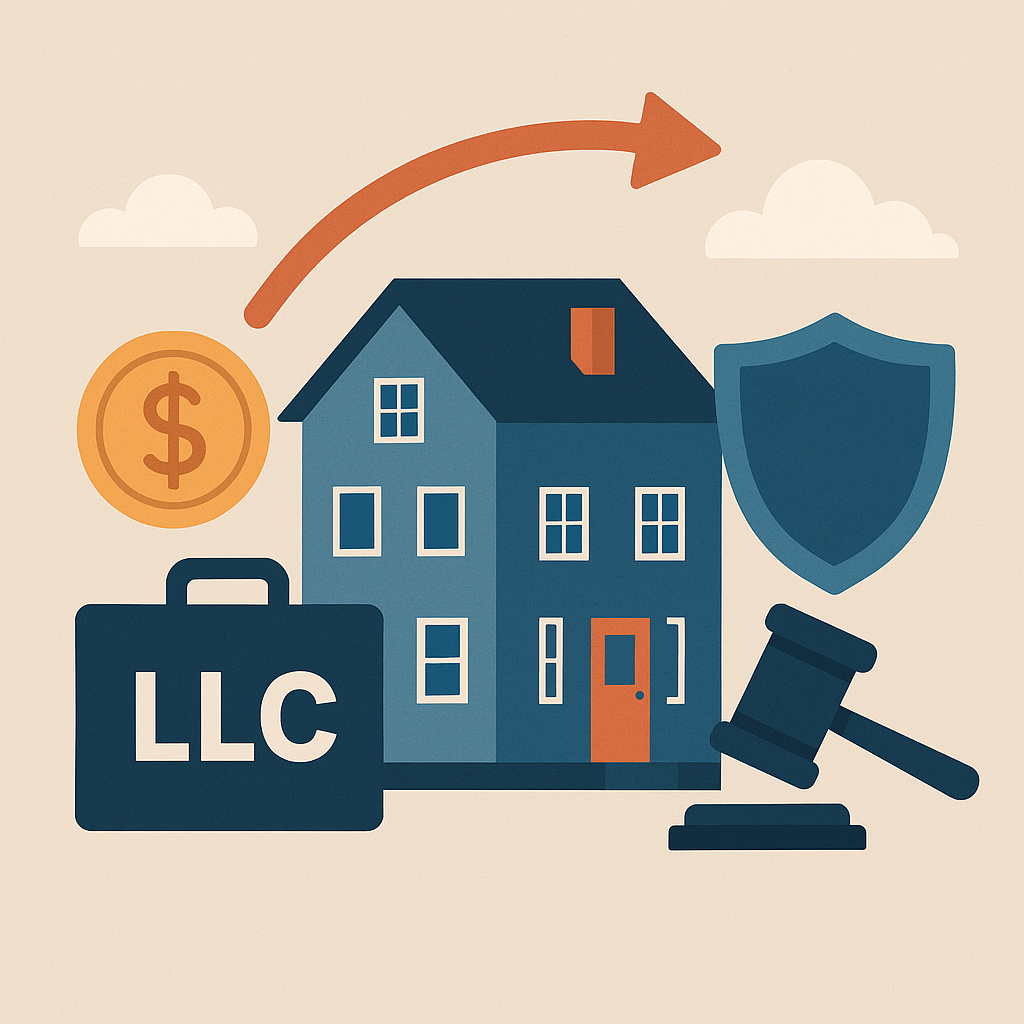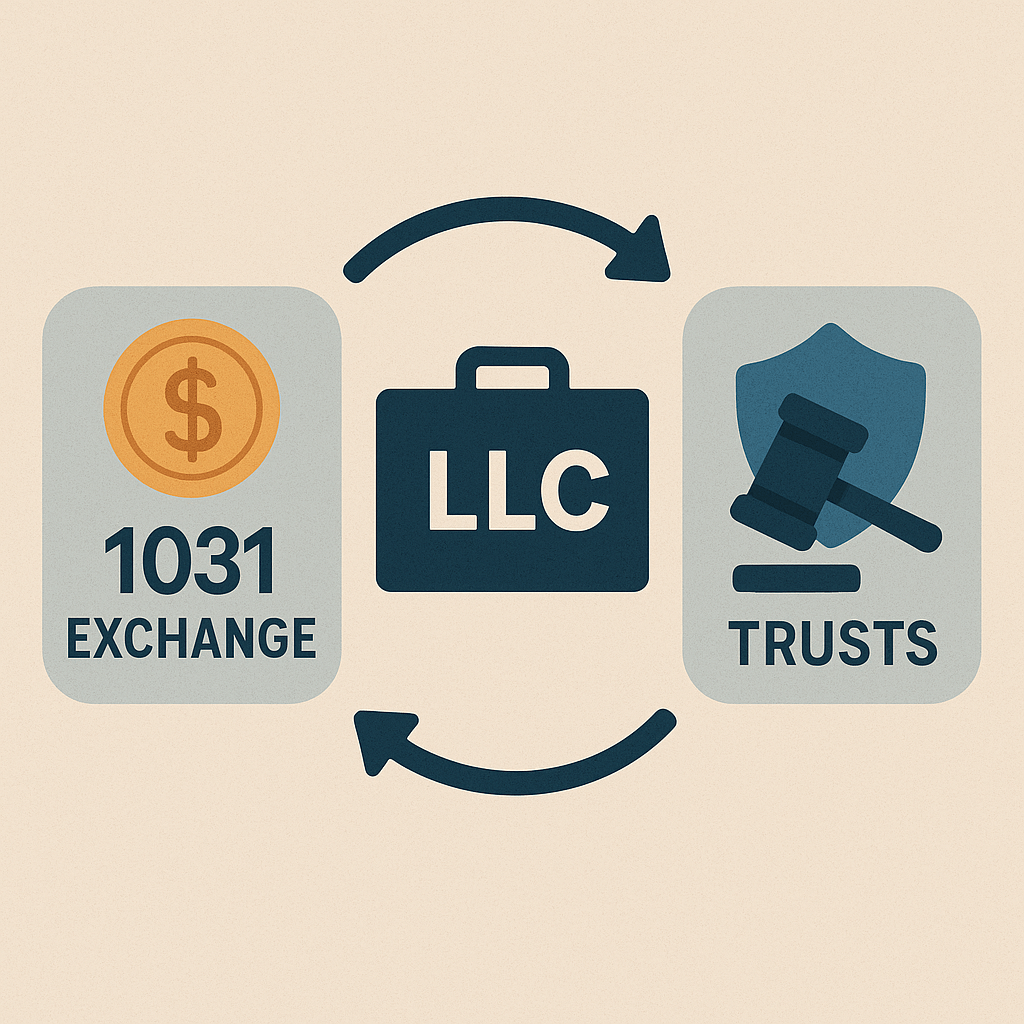Combining 1031 Exchanges with LLCs and Trusts: Maximize Tax Deferral and Asset Protection
Collaborative discussion representing 1031 exchange strategies with LLCs and trusts, featured in DK Law Group.
Hands of two people exchanging house keys, symbolizing a real estate transaction. If you're a real estate investor, you're likely looking for ways to maximize returns while safeguarding your assets. One effective strategy is to combine a 1031 exchange with other legal tools like LLCs (Limited Liability Companies) and trusts. A 1031 exchange (named after Section 1031 of the IRS code) allows you to defer capital gains taxes by reinvesting the proceeds from a property sale into a “like-kind” replacement property. By structuring your investments through LLCs and trusts, you can defer taxes and achieve robust asset protection and estate planning benefits at the same time. In this post, we’ll explore how using LLCs and trusts in tandem with a 1031 exchange can help protect your real estate investments and grow your portfolio tax-efficiently.

Why Combine a 1031 Exchange with LLCs and Trusts?
Combining a 1031 exchange with LLC and trust structures amplifies the benefits of each. Here are the main reasons investors pursue this strategy:
Tax Deferral: A 1031 exchange lets you defer capital gains taxes by reinvesting proceeds from the sale of an investment property into a new like-kind property of equal or greater value. By not paying taxes immediately, you retain more capital to reinvest, increasing your buying power and overall return on investment. Over multiple exchanges, this deferral can snowball, allowing you to grow your real estate portfolio faster than if you paid taxes on each sale.
Asset Protection: Holding properties in an LLC or certain types of trusts creates a legal separation between your assets and your personal liabilities. An LLC, for example, helps shield your personal assets from lawsuits or debts related to the property. If someone sues over something involving the property, they typically can only go after the assets of that LLC, not your personal bank account or other holdings. By combining an LLC’s liability protection with a 1031 exchange’s tax benefits, you achieve both tax efficiency and a legal liability shield for your investments. A trust (particularly an asset protection trust) can similarly insulate assets from future creditor claims while still allowing you to benefit from the income those assets generate.
Together, tax deferral and asset protection mean you keep more of your money working for you, and you reduce the risk of losing everything to an unexpected lawsuit. In short, a well-planned 1031 exchange coupled with LLCs and trusts can preserve and grow your wealth more effectively than any of these tools alone.

How to Combine 1031 Exchanges with LLCs and Trusts
To reap the full benefits, you need to structure the transaction carefully. Here’s how combining a 1031 exchange with LLCs and trusts typically works:
Using LLCs in a 1031 Exchange
When using an LLC for a 1031 exchange, proper structuring is critical:
Separate LLC per Property: It’s wise to hold each investment property in its own LLC. This way, each property’s liabilities are isolated. If one property faces a lawsuit or debt claim, it won’t jeopardize assets held under other LLCs. This structure keeps “all your eggs in separate baskets” to protect your overall portfolio.
Same LLC for Exchange: In a 1031 exchange, the same legal owner that sells the relinquished property must be the one to purchase the replacement property to satisfy the IRS’s “same taxpayer” requirement. In practice, this means the LLC that owns the old property should also acquire the new property. Keeping the title within the same LLC preserves the continuity of ownership that the IRS mandates for a valid exchange. For example, if 123 Main St. is held by ABC LLC, then ABC LLC should be the entity that takes title to the new like-kind property. Failing to do so (for instance, selling as an LLC but buying the new property in your personal name) would violate the titling rule and could disqualify your 1031 exchange. Always maintain consistency in ownership between the properties being exchanged to protect your tax-deferred status.
Using Trusts in a 1031 Exchange
Trusts come in different forms, and they can be powerful additions to your 1031 exchange strategy, especially for estate planning:
Revocable Living Trusts: A revocable living trust is a common estate planning tool that can hold title to your properties. Revocable means you maintain control over the trust assets during your lifetime and you can change or cancel the trust at any time. For 1031 exchange purposes, a revocable living trust is essentially “invisible” for tax purposes – the IRS treats the trust’s assets and income as if owned by you personally. This is good news for exchanges: since the trust is not a separate taxpayer, you can sell a property as an individual and acquire the replacement property in your living trust (or vice versa) without breaking the 1031 rules. In addition, placing real estate into a living trust means that upon your death, those properties bypass probate and transfer directly to your heirs per your instructions. (Probate is the court-supervised process that a will must go through, which can be lengthy and public. In contrast, trust assets transfer privately and efficiently.) In short, a living trust allows you to defer taxes now and smoothly pass on properties later. Estate planning advantage: By avoiding probate, you save your heirs time, court costs, and potential creditor claims on the estate. (For more on how living trusts fit into asset protection and estate planning, see our post “Learn How a Living Trust for Estate Planning Fits into the Asset Protection Landscape.”)
Asset Protection Trusts: For an additional layer of security, some investors use irrevocable trusts (often known as asset protection trusts) to hold their LLC interests or properties. An asset protection trust is a special type of trust designed to shield assets from future lawsuits or creditors. Once you transfer assets into an irrevocable trust, those assets are generally considered outside of your personal estate – which means creditors or litigants have a much harder time laying claim to them. If structured correctly, you can still receive income or benefits from the trust, but legal claimants cannot easily reach the principal. Combining an asset protection trust with a 1031 exchange can be complex, but it effectively safeguards your upgraded investment. For instance, after completing a 1031 exchange into a new property, you might place that property (or your LLC membership that owns it) into an asset protection trust. This way, the property remains tax-deferred and growth-oriented, yet it’s insulated from personal liabilities. Keep in mind: irrevocable trusts are considered separate taxpayers, so if such a trust directly holds a property, it must be the entity doing the 1031 exchange (similar to an LLC scenario). Always work with qualified attorneys to ensure any trust you use is compatible with 1031 rules and your overall estate plan.
(Many people wonder how trusts differ from wills in estate planning. In a nutshell, assets in a trust avoid probate whereas a will must go through probate court. If you’re curious about the details, check out our article “What’s the Difference Between a Will and Trust?” for a clear comparison. Also, don’t miss “The Truth About Living Trusts vs. Wills,” which dispels common misconceptions about these tools.)

Benefits of Combining These Strategies
By integrating a 1031 exchange with LLCs and trusts, you can achieve outcomes that might not be possible using any single strategy alone. Here are the key benefits of this combined approach:
Maximized Tax Savings: The primary benefit of a 1031 exchange is deferring capital gains taxes on the sale of investment property. This deferral means you have more money to invest in the replacement property than you would if you had paid taxes upfront. Over time (and possibly through multiple exchanges), you can “trade up” from smaller properties to larger ones, continuously deferring taxes and leveraging increased equity. Ultimately, if you hold property until death, your heirs may even benefit from a step-up in basis, potentially eliminating the deferred gains tax altogether. In short, you’re maximizing the tax efficiency of your real estate investments, giving you more bang for your buck with each trade.
Enhanced Asset Protection: Placing each property in its own LLC and/or a well-crafted trust means your assets are legally insulated from many personal liabilities. Should an accident or legal claim arise from one property, your other properties (held by separate LLCs or trusts) are much harder for a plaintiff to pursue. This strategy helps limit your exposure – only the assets in the targeted entity are at risk. Moreover, trusts can provide privacy and additional hurdles for anyone trying to figure out what you own. By combining asset protection entities with tax deferral, you don’t have to choose one benefit over the other. You’re effectively building wealth safely – growing your portfolio while keeping it sheltered from predators, creditors, or unforeseen lawsuits.
Estate Planning and Legacy: Using trusts as part of this strategy has significant estate planning advantages. Revocable living trusts ensure that your real estate holdings transfer to your heirs without probate, which means a faster and more private transfer of wealth. Your beneficiaries can receive income from investment properties or sale proceeds without court delays, preserving the value of the estate. Additionally, certain trust structures or family LLC arrangements can help reduce estate taxes or enable more controlled inheritance (for instance, by setting conditions on how and when heirs receive assets). By planning 1031 exchanges within an estate framework, you’re not just deferring taxes and protecting assets for yourself – you’re also preserving wealth for the next generation. This holistic approach keeps your real estate empire intact and smoothly passed down per your wishes.
Common Challenges (and How to Overcome Them)
While the benefits are clear, combining 1031 exchanges with LLCs and trusts requires careful navigation of legal and tax rules. Here are some common challenges investors face – and tips to overcome them:
Title and Ownership Issues: As mentioned earlier, one potential hurdle is the title transfer and “same taxpayer” rule. If you transfer a property’s ownership (for example, moving it into or out of an LLC or trust) too close in time to the 1031 exchange, you could inadvertently violate IRS rules. The IRS expects the taxpayer selling the old property to be the exact same as the one buying the new property. For example, say you originally bought a property in your personal name, then moved it into an LLC for liability protection. If you now sell that property via a 1031 exchange, the replacement property must be deeded to that same LLC – not to you individually or a different entity. Any mismatch in ownership between sale and purchase can nullify the exchange. How to overcome it: Plan ahead and involve your attorney or CPA early. Make sure any changes in how a property is titled are done well in advance of an exchange (or after the exchange is complete), so that during the exchange the ownership remains consistent. A qualified 1031 exchange attorney or intermediary can guide you on timing and proper title vesting to keep your exchange compliant.
Compliance with State Laws: LLC and trust laws vary from state to state, which can affect how you execute this strategy. For instance, some states have specific rules for series LLCs, land trusts, or differences in how real estate owned by a trust is taxed. If you’re doing a multi-state 1031 exchange or if your trust/LLC is formed in a different state from the property, you need to be aware of those differences. How to overcome it: Work with professionals who understand the laws in the relevant states. At DK Law Group, we tailor our strategies to meet state-specific requirements while still maximizing the benefits. This can include coordinating with local counsel, choosing the right jurisdiction for your LLC or trust, and ensuring all entities are properly registered to do business in the states where your properties are located. Diligent compliance and local insight will prevent state-level legal issues from derailing your tax-deferral and asset protection goals.
Complexity and Costs: Combining multiple legal tools (exchanges, LLCs, trusts) can introduce complexity and upfront costs (e.g., legal fees to set up LLCs and trusts, fees for a qualified intermediary in a 1031 exchange). The paperwork and coordination may seem daunting, especially for first-timers. How to overcome it: Educate yourself and assemble a solid team. Consult with a knowledgeable real estate attorney and tax advisor who have experience in 1031 exchanges and estate planning. They can simplify the process for you and handle much of the heavy lifting. Yes, there are costs to setting up LLCs or trusts and hiring professionals, but these should be weighed against the significant tax savings and asset protection you gain. In our experience, the long-term savings often far exceed the upfront expense. By viewing these steps as an investment in your financial future (rather than just an expense), you’ll recognize that professional guidance is worth it to avoid costly mistakes. With the right help, even a complex transaction can feel straightforward.
Conclusion and Next Steps
Combining a 1031 exchange with LLCs and trusts is a powerful strategy for real estate investors who want to defer taxes, protect assets, and plan for the future all at once. This approach lets you swap investment properties tax-free (for now) while shielding your wealth inside protective entities and ensuring your legacy is passed on smoothly. It’s the kind of holistic planning that separates savvy investors from the rest.
At DK Law Group, we specialize in creating customized real estate plans that align with your investment goals and legal needs. Our experienced team can guide you through the entire process — from setting up the appropriate LLCs or trusts, to executing the 1031 exchange, to making sure your assets are protected and your estate plan is in place. We act as your partner and advisor, so you can move forward with confidence, knowing that every angle is covered.
Ready to maximize your returns and safeguard your investments? 💼 Contact us today for a personalized consultation. We’ll walk you through how to implement these strategies based on your unique situation. Call us at (443) 739-6724 or email diana@dklawmd.com to get started. At DK Law Group, our mission is to protect your assets, minimize your taxes, and position you for long-term success in your real estate journey. We’re here for you – and we’ll help you navigate these complex transactions with ease and confidence.
If you found this article helpful, feel free to share it with other investors or friends who could benefit from these insights. Building wealth is even better when you bring others along! 🚀

